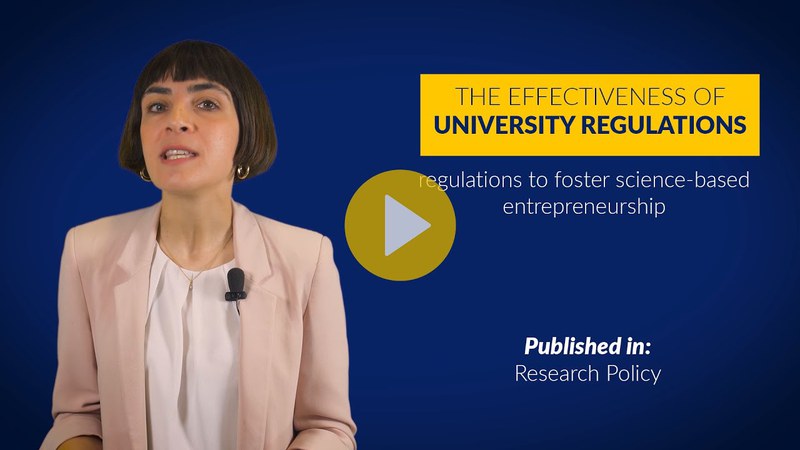The effectiveness of university regulations to foster science-based entrepreneurship
Published in: Research Policy

It is very well acknowledged that universities are fonts of innovation and economic growth through the generation of new ventures.
Research has largely documented institutional interventions, regulations, and best practices in support of academic entrepreneurship. In particular, policy intervention encompasses participation at both the level of the general environment (e.g., governors’ laws and actions) and organizational settings. However, after 40 years of research on forms of policy intervention, it is not yet clear if, when, and under what circumstances these interventions are effective in fostering science-based entrepreneurship.
In this study, we aim to understand the effectiveness of university spin-off regulations, which are specific forms of institutional intervention intended to promote the commercial exploitation of research results by creating new science-based companies. In particular, spin-off regulations govern the procedures through which spin-off companies are established, thus defining the conditions for and setting boundaries on the formal engagement of academics in these ventures.
While university regulations generally have received much attention, scholars have only recently focused on their impact.
First, we focus on the impact of the introduction of university regulations that foster entrepreneurship on the number of academic spin-offs established (hereafter, academic entrepreneurship), considering how this relation is affected by departmental characteristics. While some university departments’ organizational features may reinforce the effect of university regulations in favor of academic entrepreneurship, others may constrain such relationships.
Second, the effectiveness of regulation might depend upon its characteristics. University regulations defining rules and procedures governing the spin-off establishment process vary across universities, and their content and design will be of interest to policymakers seeking to foster better results.
Finally, policy effectiveness varies over time. The extent to which the introduction of regulation is perceived as an incentive – because it defines new conditions and creates organizational legitimacy in support of entrepreneurial practices – varies across universities. Thus, it is essential to know how long it takes for a regulation to be effective and come into force.
We collected data on the 64 Italian STEMM universities (Science Technology, Engineering, Mathematics, and Medicine), and in particular, we focused on their departments and the spin-off created between 2002 and 2012.
We find that the effect of introducing a university spin-off regulation almost doubles (+80%) the rate of entrepreneurial events per department per year. However, this effect varies across scientific disciplines and depends on specific department characteristics.
We observe that introducing university regulations is more effective within scientific disciplines characterized by better interactions with industry and that display better cognitive proximity to market dynamics; one such discipline is engineering. In addition, the regulation positively affects the creation of spin-offs across departments that are, by nature, less market-oriented, such as social sciences and humanities.
Secondly, introducing a university regulation reinforces the positive impact that a wide variety of knowledge (available within single departments) has on academic entrepreneurship. On the other hand, it hinders the positive influence that departments’ networks of formal and informal relations with industrial partners have on academic spin-off creation.
Analyzing the characteristics and contents of each regulation, we observe that general regulations positively affect the creation of new companies. On the other hand, the positive effect decreases as the rules become more detailed and constrictive on specific issues (for example, setting limits on monetary incentives or the amount of time spent on the spin-off activity).
Finally, exploiting the longitudinal nature of the data, we find that the effect of introducing a regulation is maximized four years after its introduction; later, its efficacy decreases. Thus, introducing the regulation produces immediate effects in the short-medium run and scant effects over the medium-long term.
Our findings offer some practical recommendations for university policymakers.
First of all, the application of university regulations should be tailored to specific institutional contexts and organizational settings.
Secondly, it is suggested to focus on the Departments in which regulations are less effective, building new formal processes and support schemes to develop a culture of academic entrepreneurship.
Third, universities should carefully consider new releases of internal regulations and the ‘ideal’ timing for introducing changes.
Read the full article
Authors at the Department of Management
Azzurra Meoli – Senior Assistant Professor
Academic disciplines: Entrepreneurship, Innovation
Teaching areas: Entrepreneurship, Innovation
Research fields: Entrepreneurship, Innovation, crowdfunding
Azzurra is an Assistant Professor at the Department of Management. She earned a Ph.D. in Management at the University of Bologna in March 2018. Her research interests fall primarily within the area of Management, with a particular focus on entrepreneurship and innovation. She has been visiting scholar for a year at the Whitman School of Business, Syracuse University. Her works are presented at the BCERC, AOM, DRUID.
Rosa Grimaldi – Full Professor
Academic disciplines: Innovation Management
Teaching areas: Entrepreneurship, Innovation
Research fields: international sourcing of knowledge, technology and innovation management, offshoring/outsourcing technology transfer
Rosa Grimaldi is a full Entrepreneurship and Innovation Management Professor at Alma Mater Studiorum, University of Bologna. She is the Director of the Executive Master in Technology and Innovation Management (EMTIM) at Bologna Business School.
Rosa was Deputy Major in Bologna for Innovation, Attractiveness, and Economic Promotion. She has also been the International Ph.D. in Management Coordinator and Vice-Rector for Entrepreneurship and Relations with Companies at the University of Bologna. Rosa is on the board of directors of MAPS SpA and BolognaFiere SpA.
Riccardo Fini – Full Professor
Academic disciplines: Innovation Management
Teaching areas: Entrepreneurship, Innovation
Research fields: Entrepreneurship, Technology innovation management, Technology-transfer, University-industry collaborations, Attitudes, and preferences
Riccardo Fini is a Professor and Coordinator of the Ph.D. Program in Management at the University of Bologna. He is Visiting Professor at Imperial College London, Nord Business School Bode, Ghent University, and Danish Technical University. He serves as Director of the Entrepreneurship Hub and of the Master in Entrepreneurship at Bologna Business School. He researched at Mines Paris, Case Western Cleveland, U. Bozen, and Imperial College. His research interests include entrepreneurship, science commercialization, and impact. He is a two-time recipient of the EU Marie Curie fellowship. He is also serving as Associate Editor for the Journal of Technology Transfer.
